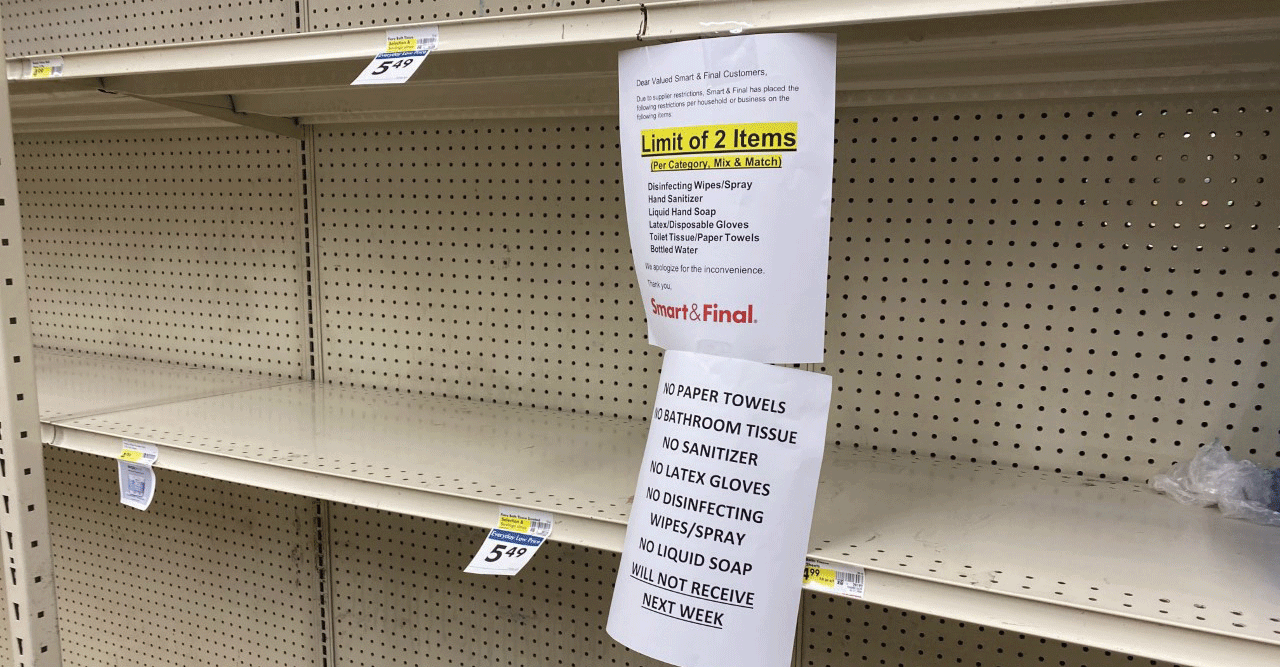Coronavirus: Signs of the times as pandemic spreads
IN THIS ARTICLE
- Central Coast Topic
- Marissa Nall and pacbiztimes Author
By Marissa Nall and pacbiztimes Thursday, March 19th, 2020
The economic impact of the coronavirus epidemic has ripped through the Tri-Counties, triggering massive job cuts and prompting San Luis Obispo County to issue a rare order for residents to shelter at home beginning March 19 in response to rising numbers of COVID-19 cases.

The county intends to hold the order for the next 30 days, but will re-evaluate the situation after two weeks have passed. The order is the most dramatic action in a series of responses as the Tri-Counties shuttered events, powered down industries and issued orders for people to stay home as COVID-19 cases rose, albeit from a very low base.
As of 4 p.m. March 19, there were 34 individuals who were confirmed to have coronavirus, with additional testing being done on a daily basis. Those cases include 13 in San Luis Obispo County, eight in Santa Barbara County and 13 in Ventura County, which has ordered a number of businesses shut.
PUBLIC HEALTH
With the disease’s progression, many state and county officials have taken to press conferences on at least a daily basis. During one such press conference, the San Luis Obispo County Public Health Department announced — in a departure from how it was previously handling cases — private labs in the area are now testing for the virus. Before, the county preferred to handle all testing itself, to get faster results and a better handle on the situation. On March 18, SLO County also disclosed that it bought 100 additional ventilators, costing $500,000, as part of its coronavirus response.
Private labs are also testing for coronavirus in Ventura County, but neither county has given an estimate on how many tests those labs have performed. The Ventura County Public Health Lab encouraged people with mild symptoms not to seek out testing, saying it wanted to save tests for more critical cases.
As an additional precaution, Ventura County announced people older than 65 should stay home, as well as people with underlying health conditions.
SMALL BUSINESSES
This is the third major disaster declaration for Ventura and Santa Barbara counties since the outbreak of the Thomas fire in late 2017.
“Before, it was localized,” said Ray Bowman, director of the Small Business Development Center of Ventura and Santa Barbara Counties. “There was a certain area that was affected. Here, we don’t need a map of which businesses are affected, because it’s everyone in the country.”
Companies are suffering from an overall decline in sales as workers everywhere are idled, and a lack of cash flow.
The SBDC has updated its disaster guides and resource tool kit for businesses, including information on unemployment insurance that can cover business owners and up to 60 percent of employee salaries, as well as deferment opportunities for taxes.
Low-interest loans are available through the Small Business Administration, though Bowman advised businesses that they need to be able to quantify losses. Protection from evictions also extend to businesses, he added.
They should also have a plan in place to communicate with both their vendors and their customers through email, social media and other channels.
“A lot of companies I think don’t know what their narrative should be right now,” Bowman said. “Silence is probably the worst thing you could do.”
Applications for disaster loans have begun to trickle in from San Luis Obispo County businesses, and some employers reported creative solutions like temporary salary cuts across the board to avoid layoffs, said Judy Mahan, director of the SLO County SBDC.
“People are trying to collaborate to make sure no one loses their job, and if they take a cut during the crisis maybe they’ll be able to ramp up again after,” she said.
One packaged food company reported seeing retail orders plummet, while online orders spiked, she said, leading the SBDC to team them up with digital marketing experts using virtual technologies like Zoom or Skype.
“Even if COVID-19 ended tomorrow, there are months and months of back orders. Inventory is low,” Bowman said. “There are all kinds of issues that businesses haven’t even felt yet.”
STOCK MARKET
Tri-county public companies saw further declines in trading March 18, capping off a turbulent week marked by heavy losses.
With an 8.8 percent decline for the S&P 500 and a 10.3 percent drop for the Dow Jones Industrial Average, tri-county stocks lost around 6.6 percent of their value over the week.
Westlake Village financial stocks PennyMac Mortgage Investment Trust and PennyMac Financial Services recorded some of the steepest losses, falling 70 percent and 50 percent, respectively. The decline in the two companies, which originate and service home mortgages, suggests Wall Street is casting a wary eye on the housing market.
Shares for Goleta breast implant company Sientra also shed around 51 percent, while footwear manufacturer Deckers Brands lost more than 40 percent for the week.
Regional biotech giant Amgen withstood the market declines, gaining 3.1 percent overall. But Thousand Oaks-based Teledyne Technologies and Ventura adtech firm The Trade Desk, the region’s second and third largest companies, both shed more than 30 percent apiece.
Also on an upswing, Calavo Growers shares regained around 5 percent, after losses the prior week, ending around $55 per share.
AIRPORTS AND TOURISM
Airports are feeling hits from coronavirus close to home. While none of the airports in the tri-county region serve international locations, Contour Airlines announced March 18 that it was shutting down operations in San Luis Obispo indefinetely.
In a news release, the company said the decision was a result of “sudden, severe travel restrictions across the nation.” Its last day of service will be March 30.
“We firmly believe in the San Luis Obispo market and fully intend to resume service when public health and economic conditions allow us to do so,” said Contour Airlines CEO Matthew Chaifetz.
Festivals, conferences and other events throughout the tri-county region were also postponed or canceled, as the Centers for Disease Control and Prevention recommended canceling community-wide mass gatherings, such as any event with more than 250 people, and canceling any gathering of more than 10 people for organizations that serve higher-risk populations.
VENTURA COUNTY CLOSURES
Ventura County announced March 18 that it was closing most of its buildings to the public, with the exception of hospitals, clinics and other first response and public safety services.
“A threat like this requires bold action. We do not do it lightly. We need to do all we can to protect the public and our employees in the midst of this expanding public health crisis,” said County CEO Mike Powers in a news release.
RESTAURANTS AND GROCERIES
Public health officials encouraged other dramatic actions from residents as cases started to climb.
On March 16, the California Department of Public Health announced all locations that sell alcohol should close, with the exceptions of venues currently authorized to sell beer and wine for off-site consumption.
Restaurants were also told to switch to just delivery, takeout and other to-go options. With decreased business, many restaurants have opted to reduce their hours or close entirely until it’s safe for them to do business again.
As restaurants have been forced to change their operations, the state encouraged grocery stores to stay open and fully operational with patrons practicing social distancing. Several grocery stores in Ventura County started holding early service grocery hours for those who are elderly, disabled or pregnant.
The changes have deeply impacted how produce provider The Berry Man is conducting its business. The Berry Man does a lot of delivery to restaurants, and Lee Clark, president of the company, said he’s seen a 50 percent drop in business in San Luis Obispo County, with upward of a 70 percent drop in areas like Santa Barbara, Oxnard, Ventura and Los Angeles.
Because of the decline, he’s had to make difficult business decisions. Starting the week of March 9, Clark put all employees on a four-day work schedule, and for the week of March 16, he had to drop it to three days. He said he’s looking at only having his people work two days during the week of March 23.
The Berry Man employs about 240 people. The reduced working schedules are a way for him to avoid laying anyone off during this time. He’s encouraging his employees to seek state assistance and apply for unemployment to help make up for the lost working hours and the decreased paychecks.
Additionally, The Berry Man is seeking to fill in some of its gaps by reaching out to local grocery stores, which tri-county residents have been hitting hard in the face of quarantines and enforced stay-at-home orders, such as the one being implemented in San Luis Obispo.
Jordano’s, a food and beverage supplier, is seeing similar impacts to its business from the coronavirus. While many of the restaurants, hotels, hospitals and schools that are the main customers for food and beverage supplier Jordano’s have cut back operations, demand has increased for shelf-stable products and to-go supplies, said General Manager Mike Sagraves.
“Many of these businesses have closed or lessened their operations in reaction to direction from CDC or Santa Barbara County,” Sagraves said. “As they go, we sort of go as well.”
Previous disasters, including wildfires and the 2018 mudslides in Montecito, helped prepare businesses for interruptions in the short term, he said.
“It’s gotten us a little more educated in responding to those sort of things,” Sagraves said. “We’ve had to get out of our normal comfort zone in the past to react to situations of an emergency nature. Having some experience makes it a little easier to operate outside the box.”
Other businesses are a little less optimistic. Clark said the current situation is unprecedented, even for local businesses that withstood disasters in the past. Even still, The Berry Man is in a financially stable position, and it can withstand the interruptions in business for a few months.
“The goal is to wait it out,” Clark said. “We’ll be okay for several months. After that, things might get difficult.”
Still, coronavirus impact is going to be felt for a while after the disease calms down. The Berry Man was in talks with the city to build a new facility in Oxnard, but those talks have been shelved for the time being.
Jordano’s saw a run on brown bags as schools transitioned to supplying meals for students at home. But a majority of the restaurants it served were family-owned operations that can’t absorb months of lost sales.
“It’s hard to anticipate demand with what we anticipate being greater loss of business as this thing filters through,” Sagraves said. “We’re at the very beginning point.”
• Contact Amber Hair at [email protected].
Related Articles
 Friday, October 14th, 2022
Friday, October 14th, 2022










